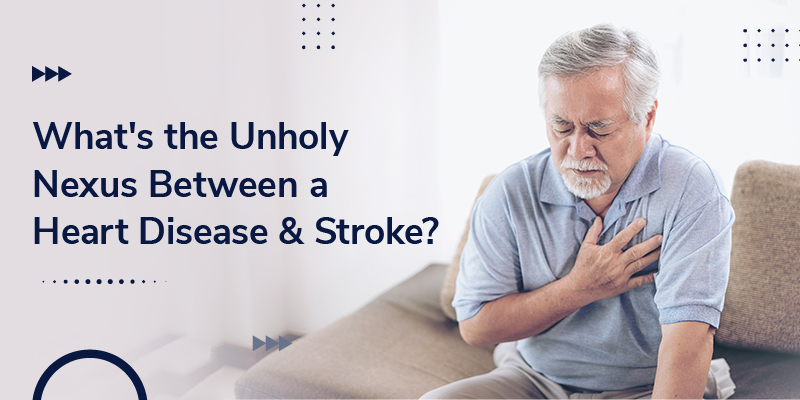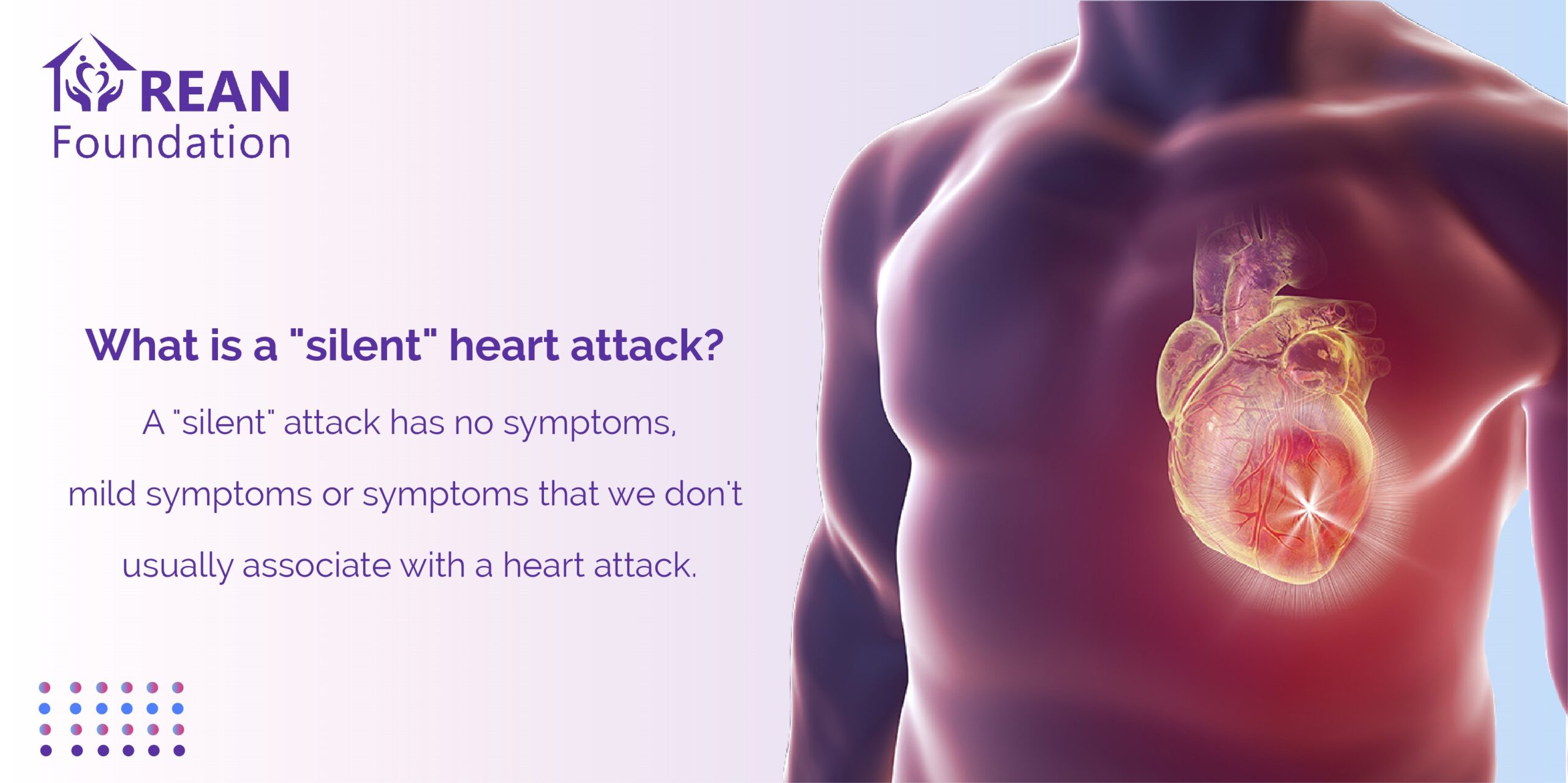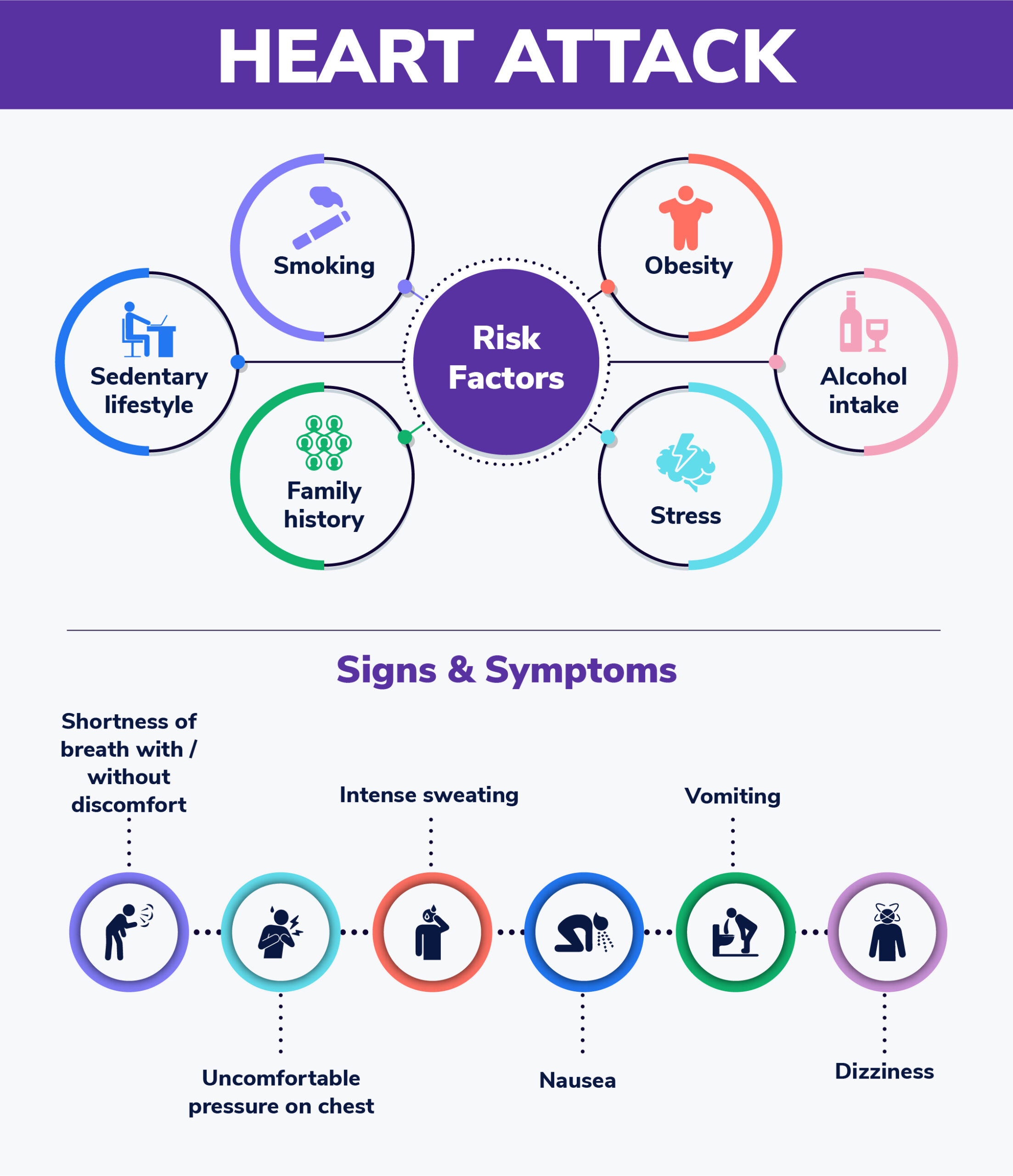
What's the Unholy Nexus Between a Heart Disease & Stroke?
Heart Attack and Stroke are often-heard medical conditions that imply nothing but doom. These closely-related Cardiovascular Diseases (CVDs) often stem from the same health problems and risk factors. It's alarming to note that these diseases are prevalent among people of all ages, genders, and ethnicities. EVERYONE is vulnerable, which is why there is cause for worry.
This article takes an in-depth look at:
- Signs & symptoms of heart diseases and stroke
- Contributing factors behind cardiac disorders
- Treatment & prevention
Let's read on.
Stroke & Heart Attack: The Deadly Duo
Ask medical experts worldwide about the deadliest diseases of humanity, and they would all point fingers at Cardiovascular Diseases.
The World Health Organization observes CVDs as the leading cause of death globally. In 2019, an estimated 17.9 million people lost their lives to CVDs. Nearly 85% of these deaths were due to heart attack and stroke. And there's more bad news. According to the CDC, nearly 659,000 people in the US die of heart attack and 795,000 people have a stroke.
Why are there so many deaths due to CVDs? One can say that heredity is to blame. However, there is no denying the slew of unhealthy habits that play a significant role in causing these diseases even amongst the younger generation, like:
- Unhealthy lifestyle
- Smoking
- Alcohol intake
- Lack of physical activity
- Family history
- Stress
You may be surprised to know that seemingly unrelated conditions like gum diseases can also aggravate the risk of heart attacks and stroke.
How closely connected are these two diseases?
Here's where Artherosclerosis comes into the picture. Atherosclerosis is the build-up of fat in the arteries, which is the prime cause of stroke and heart attack. Such fat accumulation prevents blood flow to the heart and causes blood clots that can travel to the brain and heart, leading to devastating results. Moreover, a person who has suffered a heart attack is highly likely to have a stroke.
So, yes, the risks are huge.
Another big hazard is the delay of timely medical aid when either of these conditions occurs. Lack of the right treatment within the "golden hour" can aggravate the severity of the condition or even cause death. To prevent this from happening to you or your loved ones, it is important to know the signs and symptoms of a heart attack or stroke.
Warning Signs of Heart Attack & Stroke
Telltale Symptoms of a Heart Attack

Heart attacks can be dramatically intense and sudden. There are also the "silent" attacks that start with subtle pain and discomfort in the chest, stomach, back, neck, jaws, shoulders, and arms. The pain may last only for a minute or two and go away only to return after some time. The person may also experience:
- Shortness of breath with or without discomfort
- Uncomfortable pressure or squeezing on the chest
- Intense sweating
- Nausea
- Vomiting
- Dizziness
Ominous Signs of a Stroke
The following symptoms indicate a stroke:
- Numbness or weakness on one side of the body, particularly the limbs.
- Confusion and slurring of speech.
- Difficulty in understanding speech
- Intense headache without any apparent reason.
- Loss of balance and coordination.
- Sudden dizziness
- Sudden inability to walk
- Trouble with vision in one or both eyes
The above lists show that heart attacks and strokes manifest themselves in remarkably distinctive ways. However, both these diseases also share similar warning signs, as in they:
- Cause debilitating health issues that may or may not rectify with time.
- Require immediate medical attention
- Can be fatal if the person already suffers from a damaged heart or brain tissue

Heart Attack Versus Stroke: Which is Worse?
There is no clear winner regarding a heart attack or stroke. Both conditions are equally life-threatening and require the same medical attention. In fact, considering the similarities between both conditions, neurologists refer to strokes as "brain attacks."
You do not want to end up with either condition because both can severely disrupt your normal life or cause death. Unfortunately, surviving a stroke is way more difficult than surviving a heart attack because of the damage to the brain tissues. Seriously damaged brain tissues can leave you severely disabled for life, causing:
- The loss of the ability to communicate verbally.
- Inability to use the limbs on one side of the body.
Five Contributing Factors for Heart Attack & Stroke
Of late, heart attack and stroke have become common occurrences, thanks to five contributing factors.
1.Stress
Stress is a silent killer. A recent study published in The Lancet explains how prolonged stress causes the inflammation of the arteries, leading to heart attacks and strokes. Stress can also cause:
- High blood pressure
- High cholesterol levels
- High blood sugar
- Raised triglyceride levels
- Physical inactivity
- Overeating
2. Sedentary lifestyle
Are you a couch potato? Do you prefer staying put in one place rather than moving around briskly? A sedentary lifestyle and lack of physical activity can significantly increase the risks of heart disease and stroke.
3. Unhealthy habits
Smoking and alcohol intake do no good for the body. Smoking, in particular, increases the risk of heart attacks. And that's not all. The CDC says that passive smoking can also cause heart diseases and increase the risk for stroke by 20-30%.
4. Family History
Genetics plays a major role in one's heart health. Of course, it is a factor that cannot be changed, which further stresses the need to follow a healthy lifestyle.
5. Unhealthy diet
Unhealthy food intake is one of the biggest causes of concern because it contributes to several conditions like obesity, diabetes, high cholesterol etc., that can significantly increase the risk for stroke and heart attacks.
Also Read: Making Pregnancy & Motherhood A Breeze with Technology
Heart Attack & Stroke - Prevention & Treatment Options
Now that we've analyzed the causes, signs, and symptoms of these two diseases, it all boils down to one question: Are heart attacks and strokes preventable? Fortunately, they are.
According to the American Heart Association, you can reduce all modifiable risk factors using an ABC approach:
Avoid Tobacco
Everything about smoking is bad. It increases your blood pressure, causes the thickening of artery walls, and decreases the good cholesterol in your body. It also significantly increases the risk of stroke.
Be Active
All one needs is thirty minutes of daily brisk physical activity to ward off heart attacks and strokes.
Choose Good Food
"Good Food" means fresh, fibrous and nutritious food. Food is critical in controlling risk factors such as diabetes and obesity, which are major contributors to heart attacks and strokes.
The ABC is not a difficult approach to follow these days, thanks to the advent of smart healthcare technology. Health apps like the REAN HealthGuru can be your reliable healthcare companion that helps keep your vitals in check, assist you with balanced diet plans, monitor your physical activity and nutrition needs, and facilitate a stress-free lifestyle. Today, with the digital revolution, good health is just one click away!
Treatment for Heart Attack & Stroke
For Heart Attacks
When a person loses consciousness after an attack, Cardio Pulmonary Resuscitation (CPR) is administered as the initial emergency treatment to revive the patient's pulse even when a defibrillator is ineffective. Other treatment options include:
- Clot-busting medication to open up blocked arteries.
- Angioplasty or stent placement
- Coronary artery bypass grafting
- Consumption of four chewable 81mg baby aspirin (for emergencies)
For Strokes
Stroke treatment is largely time-dependent. The time taken to diagnose stroke is critical because each type of stroke requires different treatment. Here are the do's and don’ts to follow when a person has a stroke.
DO NOT give aspirin to persons having a stroke. Aspirin can worsen the condition if it is a Haemorrhagic stroke.
In the Emergency Room (ER), a head CT scan has to be taken to determine the brain status and cause of the stroke. The treatment can be similar to that of heart attacks, if:
- The CT scan reveals an Ischemic Stroke.
- If the symptoms start within 4.5 hours of evaluation.
Under these circumstances, doctors may administer a clot-dissolving medication if there are no contraindications. Moreover, treating stroke requires the input of medical experts like radiologists, neurologists, and emergency physicians. Sometimes, patients who have suffered severe heart attacks or stroke may also require life-support through ventilators.
Take Charge of Your Health With REAN HealthGuru
There is no replacement for good health. It is something that should never be compromised- not for the sake of your laziness, unhealthy habits, or bad diet. Adopt healthy living today! Eat wisely, move a lot, and say goodbye to cigarettes and alcohol. Do whatever it takes to safeguard your heart and brain.
Manage your health and wellness with the REAN platform. Check out the REANHealthGuru app to make good health your partner for life.
Heart Attack and Stroke are often-heard medical conditions that imply nothing but doom. These closely-related Cardiovascular Diseases (CVDs) often stem from the same health problems and risk factors. It's alarming to note that these diseases are prevalent among people of all ages, genders, and ethnicities. EVERYONE is vulnerable, which is why there is cause for worry.
This article takes an in-depth look at:
- Signs & symptoms of heart diseases and stroke
- Contributing factors behind cardiac disorders
- Treatment & prevention
Let's read on.
Stroke & Heart Attack: The Deadly Duo
Ask medical experts worldwide about the deadliest diseases of humanity, and they would all point fingers at Cardiovascular Diseases.
The World Health Organization observes CVDs as the leading cause of death globally. In 2019, an estimated 17.9 million people lost their lives to CVDs. Nearly 85% of these deaths were due to heart attack and stroke. And there's more bad news. According to the CDC, nearly 659,000 people in the US die of heart attack and 795,000 people have a stroke.
Why are there so many deaths due to CVDs? One can say that heredity is to blame. However, there is no denying the slew of unhealthy habits that play a significant role in causing these diseases even amongst the younger generation, like:
- Unhealthy lifestyle
- Smoking
- Alcohol intake
- Lack of physical activity
- Family history
- Stress
You may be surprised to know that seemingly unrelated conditions like gum diseases can also aggravate the risk of heart attacks and stroke.
How closely connected are these two diseases?
Here's where Artherosclerosis comes into the picture. Atherosclerosis is the build-up of fat in the arteries, which is the prime cause of stroke and heart attack. Such fat accumulation prevents blood flow to the heart and causes blood clots that can travel to the brain and heart, leading to devastating results. Moreover, a person who has suffered a heart attack is highly likely to have a stroke.
So, yes, the risks are huge.
Another big hazard is the delay of timely medical aid when either of these conditions occurs. Lack of the right treatment within the "golden hour" can aggravate the severity of the condition or even cause death. To prevent this from happening to you or your loved ones, it is important to know the signs and symptoms of a heart attack or stroke.
Warning Signs of Heart Attack & Stroke
Telltale Symptoms of a Heart Attack

Heart attacks can be dramatically intense and sudden. There are also the "silent" attacks that start with subtle pain and discomfort in the chest, stomach, back, neck, jaws, shoulders, and arms. The pain may last only for a minute or two and go away only to return after some time. The person may also experience:
- Shortness of breath with or without discomfort
- Uncomfortable pressure or squeezing on the chest
- Intense sweating
- Nausea
- Vomiting
- Dizziness
Ominous Signs of a Stroke
The following symptoms indicate a stroke:
- Numbness or weakness on one side of the body, particularly the limbs.
- Confusion and slurring of speech.
- Difficulty in understanding speech
- Intense headache without any apparent reason.
- Loss of balance and coordination.
- Sudden dizziness
- Sudden inability to walk
- Trouble with vision in one or both eyes
The above lists show that heart attacks and strokes manifest themselves in remarkably distinctive ways. However, both these diseases also share similar warning signs, as in they:
- Cause debilitating health issues that may or may not rectify with time.
- Require immediate medical attention
- Can be fatal if the person already suffers from a damaged heart or brain tissue

Heart Attack Versus Stroke: Which is Worse?
There is no clear winner regarding a heart attack or stroke. Both conditions are equally life-threatening and require the same medical attention. In fact, considering the similarities between both conditions, neurologists refer to strokes as "brain attacks."
You do not want to end up with either condition because both can severely disrupt your normal life or cause death. Unfortunately, surviving a stroke is way more difficult than surviving a heart attack because of the damage to the brain tissues. Seriously damaged brain tissues can leave you severely disabled for life, causing:
- The loss of the ability to communicate verbally.
- Inability to use the limbs on one side of the body.
Five Contributing Factors for Heart Attack & Stroke
Of late, heart attack and stroke have become common occurrences, thanks to five contributing factors.
1.Stress
Stress is a silent killer. A recent study published in The Lancet explains how prolonged stress causes the inflammation of the arteries, leading to heart attacks and strokes. Stress can also cause:
- High blood pressure
- High cholesterol levels
- High blood sugar
- Raised triglyceride levels
- Physical inactivity
- Overeating
2. Sedentary lifestyle
Are you a couch potato? Do you prefer staying put in one place rather than moving around briskly? A sedentary lifestyle and lack of physical activity can significantly increase the risks of heart disease and stroke.
3. Unhealthy habits
Smoking and alcohol intake do no good for the body. Smoking, in particular, increases the risk of heart attacks. And that's not all. The CDC says that passive smoking can also cause heart diseases and increase the risk for stroke by 20-30%.
4. Family History
Genetics plays a major role in one's heart health. Of course, it is a factor that cannot be changed, which further stresses the need to follow a healthy lifestyle.
5. Unhealthy diet
Unhealthy food intake is one of the biggest causes of concern because it contributes to several conditions like obesity, diabetes, high cholesterol etc., that can significantly increase the risk for stroke and heart attacks.
Also Read: Making Pregnancy & Motherhood A Breeze with Technology
Heart Attack & Stroke - Prevention & Treatment Options
Now that we've analyzed the causes, signs, and symptoms of these two diseases, it all boils down to one question: Are heart attacks and strokes preventable? Fortunately, they are.
According to the American Heart Association, you can reduce all modifiable risk factors using an ABC approach:
Avoid Tobacco
Everything about smoking is bad. It increases your blood pressure, causes the thickening of artery walls, and decreases the good cholesterol in your body. It also significantly increases the risk of stroke.
Be Active
All one needs is thirty minutes of daily brisk physical activity to ward off heart attacks and strokes.
Choose Good Food
"Good Food" means fresh, fibrous and nutritious food. Food is critical in controlling risk factors such as diabetes and obesity, which are major contributors to heart attacks and strokes.
The ABC is not a difficult approach to follow these days, thanks to the advent of smart healthcare technology. Health apps like the REAN HealthGuru can be your reliable healthcare companion that helps keep your vitals in check, assist you with balanced diet plans, monitor your physical activity and nutrition needs, and facilitate a stress-free lifestyle. Today, with the digital revolution, good health is just one click away!
Treatment for Heart Attack & Stroke
For Heart Attacks
When a person loses consciousness after an attack, Cardio Pulmonary Resuscitation (CPR) is administered as the initial emergency treatment to revive the patient's pulse even when a defibrillator is ineffective. Other treatment options include:
- Clot-busting medication to open up blocked arteries.
- Angioplasty or stent placement
- Coronary artery bypass grafting
- Consumption of four chewable 81mg baby aspirin (for emergencies)
For Strokes
Stroke treatment is largely time-dependent. The time taken to diagnose stroke is critical because each type of stroke requires different treatment. Here are the do's and don’ts to follow when a person has a stroke.
DO NOT give aspirin to persons having a stroke. Aspirin can worsen the condition if it is a Haemorrhagic stroke.
In the Emergency Room (ER), a head CT scan has to be taken to determine the brain status and cause of the stroke. The treatment can be similar to that of heart attacks, if:
- The CT scan reveals an Ischemic Stroke.
- If the symptoms start within 4.5 hours of evaluation.
Under these circumstances, doctors may administer a clot-dissolving medication if there are no contraindications. Moreover, treating stroke requires the input of medical experts like radiologists, neurologists, and emergency physicians. Sometimes, patients who have suffered severe heart attacks or stroke may also require life-support through ventilators.
Take Charge of Your Health With REAN HealthGuru
There is no replacement for good health. It is something that should never be compromised- not for the sake of your laziness, unhealthy habits, or bad diet. Adopt healthy living today! Eat wisely, move a lot, and say goodbye to cigarettes and alcohol. Do whatever it takes to safeguard your heart and brain.
Manage your health and wellness with the REAN platform. Check out the REANHealthGuru app to make good health your partner for life.



